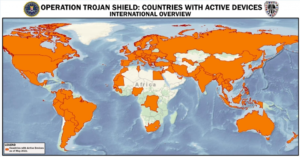In recent years, warrant-proof encryption has created increasingly complex challenges for law enforcement investigations. Warrant-proof encryption prevents law enforcement from accessing data relevant to investigations, even with a warrant in-hand. As a result, law enforcement agencies have been forced to adapt to the use of encryption by criminal networks, finding new ways to access criminals’ communications.
On June 8th, the global law enforcement community set into motion sweeping arrests stemming from the largest law enforcement operation against major criminal networks to date. The FBI created its own platform, Anom, to gain access to criminals’ communications about killings, money laundering, drugs, and firearms trafficking. Law enforcement previously disrupted encryption services used by criminals. The disruption created a new demand for an encryption service. This was filled by the creation of Anom under Operation Trojan Shield. Over the course of 18 months, more than 12,000 devices with the Anom software were distributed to hundreds of criminal organizations around the globe. From those thousands of devices, the FBI, EuroPol, DEA, the Australian Federal Police, and other agencies collected more than 27 million messages. In total, law enforcement seized $48 million worth of currency, 32 tons of various drugs, and other property connected to crimes.

Operation Trojan Shield highlights law enforcement’s increasing ability to monitor encrypted communication networks in real time, allowing law enforcement to disrupt international criminal networks. Similarly to Trojan Shield, in 2020, law enforcement made more than 700 arrests after a successful operation penetrated EncroChat, an encrypted chat provider to criminals. However, Trojan Shield represents a shift in tactics from penetrating existing networks to being able to create honeypot networks.

Operation Trojan Shield highlights how Praescient’s capabilities of training, integration, customization, and embedded analytic services to clients will always be in demand for law enforcement around the globe. In a previous retail fraud investigation, Praescient’s Analysis as a Service Team sifted through large amounts of customer data from retailers to map out geographic patterns and determine the distribution center of origin. Praescient Subject Matter Experts leverage similar styles of data synthesis techniques to assist law enforcement operations, like Operation Trojan Shield. Praescient also assisted litigation in a high-profile Ponzi Scheme by analyzing communications and mapping connections between known or suspected fraudsters. The training and expertise provided by Praescient provides valuable services to organizations worldwide to assist with international criminal investigations like this in the future.